| Article Overview:
Mo Duc, Vietnam--A reminder from thirty-five years ago of the price
Americans are paying in Iraq to provide liberty's foundations, even if
the shame and guilt of a few tarnish and taint our image of all those
who believe their first mission is to provide freedom rather than
torture and tyranny. |
 VigilanceVoice VigilanceVoice
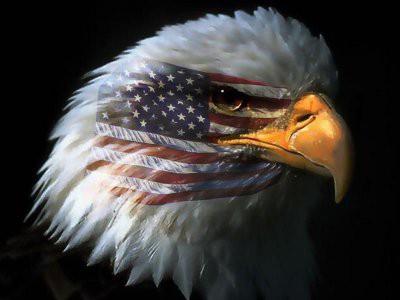
Saturday, May 8,
2004—Ground Zero Plus 969
___________________________________________________________
Mo Duc--A Reflection On The Price Of Death In Iraq!
_____________________________________________________________________
by
Cliff McKenzie
Editor, VigilanceVoice.com
|
GROUND ZER0, New York, N.Y.--May 8, 2004 -- It is easy to
forget the role of America as the Sentinel of Global Vigilance when
our newspapers and televisions are splattered with scenes of horror
depicting young Americans dragging naked Iraqi prisoners by the neck
with ropes and smiling at cameras for their "trophy pictures."
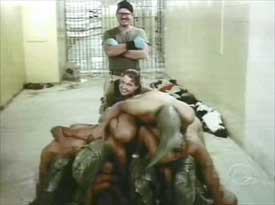 |
|
Misguided
Americans with their "Trophy pictures" |
But these graphically ugly
scenes are not what this or any American war has been based upon, at
least not when it comes to the average warrior who risks his or her
life to fight for a stranger's freedom and liberty.
I know. I'm one of them.
And perhaps my story about Mo Duc, Vietnam, some thirty-five years ago might shed a bigger brighter light
on death pall that shrouds our view of our true mission in Iraq-- the
mission of the "Warriors of Vigilance."
Let me spin you back a generation
ago to 1966. The war in Vietnam
was just being launched. The hatred and angst that nearly tore
our nation apart was fomenting, but hadn't yet turned into a pustule
of venom that volcanically erupted into armed combat between anti-war
protestations and a government bogged in a quagmire it couldn't
escape.
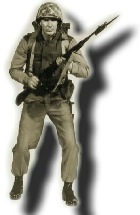 |
|
I was one of
the first US Marine Combat Correspondents to land in Vietnam |
I was one of the first U.S. Marine
Combat Correspondents to land in Vietnam. My first mission was
an amphibious assault, the largest since the Korean War, in late l965.
It was followed by another landing with the First Marine Division to
take command of Chu Lai.
I volunteered to report from the front
lines, and was assigned to the 2nd Battalion, 7th Marines where I set
up my typewriter on a field desk in the S-1 tent and immediately began
to pick out the fiercest fighting units so I could get a look at war's
underbelly first hand.
Marine Combat Correspondents, like all
Marines, are first riflemen. We fought and killed first,
then we wrote. We were not exempt from the role of "Warrior."
We all were trained to kill with efficiency, precision; even the
cooks were killers first and culinary experts second.
Like all Marines lured to the Corps with
signs like "We Make Men!," I wanted to prove my
valiant nature in war. I frequently volunteered
take the point, to stalk ahead of the troops and forage into enemy
territory. I grew up in the woods in Oregon and
imagined myself an Indian countless times. Crouch-creeping through the
jungle at the head of the pack was exciting, thrilling. It
also gave my ink on paper a deeper respect for those who were the
first targets. One cannot adequately write about heroism, I
believed, until one has tasted a hero's fear, his anticipation of
battle, his
fearlessness to die for what he believes is right, just.
I, like the countless others who
joined the Marine Corps, truly believed we were on a mission of
liberation. Our job was to free the oppressed people of Vietnam
so that they too could have similar rights
and privileges to those we enjoyed, our children enjoyed, and our
children's Children's Children could enjoy. I was there to
remove that shadow of tyranny and
oppression of Communism that choked and strangled, and often tortured
the Vietnamese's fundamental rights to choose their own destiny.
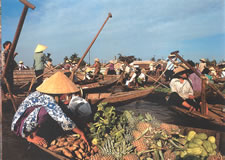 |
|
The Vietnamese
were like any people ... |
The Vietnamese people were
like any people ground down by the boot heel of tyranny. They
hadn't advanced beyond the rice farmers of hundreds and hundreds of
years past for their social structure had been dominated by dictators,
conquers and dynasties that cleaved them into two classes--serfs and
lords.
Most were farmers, living in grass hooches on
bare dirt floors with old black cooking pots brewing noxious mixtures
of fish heads for an oily sauce they put on everything. There
were no televisions, radios, newspapers, roads for the majority--just paths that
wandered throughout the land leading from one village to another.
A few cities existed, bespeaking of power and culture such as Saigon
and DaNang, but the land was fertile, the rice the gold of the
country, lusted by a hungry world and to till the soil and reap the
crops meant the "slaves of the earth" must not be disturbed.
In the most primitive
villages in the heart of V.C. territory the children ran half-naked
with few schools except those the Viet Cong ran, teaching them to hate
Americans or the French, to defy liberation and to accept the power
and might of a central government that "knew best for them."
I remember seeing many pictures
scrawled on the walls of these "schools" showing American tanks,
cartooned as machine monsters, crushing children under their treads
with the American flag flying atop the "monster."
I also knew that Vietnam had been at
war for over 300 years--the French, the Japanese, and countless others
seeking to command the fertile rice belt and its precious shipping
ports that served as the crossroads to Asia. Vietnam
could help feed the world with its rice, a treasure that made many
nation's mouth drool.
But we weren't there for the rice, at least
not the average grunt Marine sweating and swatting mosquitoes.
Just as in Iraq the average GI Joe or GI Jane isn't there to seek
low-priced oil, but is more concerned with a young girl not being
raped and tortured, or that veils may be dropped without the feminine
faces being beaten
in the streets for the exposure, or that a young boy might
realize that he could one day become the President of Iraq by winning
enough votes rather than marshalling an armed coup to take over one
tyrant to replace him with another.
We were fighting for the rights of the
Vietnamese, fundamental rights, not lofty ones.
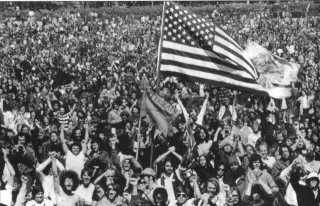 |
|
Demonstrators
against the Vietnam War |
But as the pressure at home
against the war grew, the value of an American death in Vietnam
depreciated, as the deaths in Iraq today are depreciating.
Instead of seeing the deaths of Americans for liberty and freedom as a
great sacrifice for the future of a people and their children, the nation began to see
the deaths of Americas a political slaughter, about a power-hungry
Administration shoving young men into the breech of canons and
recklessly shooting them out in a vainglorious attempt to make an
ill-fated war successful.
There can be little question the 170,000 volunteers who fight
and offer their lives as "liberators" of the children's future freedom
aren't beginning to feel
the same shame that we felt in Vietnam--that our deaths or those of our
comrades--will be viewed more as a "waste" of human life than
as an investment in the future of a people's liberty and freedom.
That's the horribly sad
result of what we are seeing today as the pictures of Iraqi prisoner
abuse slam against the moral conscious of our nation, and fuel the
critics of the world to point fingers at America as being nothing more
than the same Terrorists and tyrants as those we deposed when we attacked Iraq in March of this year.
But, as both a U.S.
Marine Combat Correspondent of the past, a citizen of democracy, a
father of two and grandfather of three beautiful free children, I know that the flap
over the photos of the prisoners is nothing more than a sore on the
pure mission of liberation that the vast majority of American
soldiers, airmen, Marines and coast guarders face each day when they
ask: "Why Am I Here?"
Let me give you my small
but important example of how I know this and that what we did in Vietnam
or are doing in Iraq was and is the right thing to do despite recent
taint on our mission's credibility.
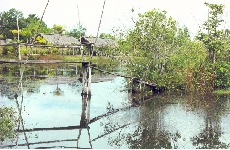 |
|
I know America
did the right thing in Vietnam because of my experiences in Mo Duc |
My example is a place called
Mo Duc, a story I have related many times over many of the thirty-six
years since I first set foot in Vietnam.
It was 1966 and the nation of
Vietnam was conducting its first truly democratic election in history,
not unlike the impending situation in Iraq where the people will be
vested with the "right to vote" without a gun to their heads. The election was planned to illustrate the importance of democracy,
and to reinforce that America was there to establish freedom.
Mo Duc was a small provincial village
along Highway One that ran along the coast from one end of Vietnam to
the other.
I volunteered to go with the units
assigned to protect Mo Duc from threats by North Vietnamese Regulars
that they would attack and kill any villager who voted that day.
Communism and democracy don't mix, so our job was to serve as armed
guards to keep the NVA and Viet Cong from stopping the voting process.
En route to our position to guard Mo
Duc, the Viet Cong had blown bridges and mined the roads to thwart our
advance.
Engineers worked feverishly to repair
the damage and we bounced and joggled in the trucks, ducking to avoid
sniper fire along the road as we wended our way to set up one of many
blocking forces around the country so people could vote without threat
of being killed.
It is hard for the average American
to think about receiving a death threat on election day, and that its
warning says: "If you step foot out of your house to vote today
you will be killed, your wife and children will be killed, and all
your relatives."
That was essentially the warning from
the NVA, the rugged and tough North Vietnamese troops who wanted to
strike Fear, Intimidation and Complacency into the hearts of all
Vietnamese.
And the message wasn't delivered over
the radio, newspaper or television. It was personally
delivered, eye-ball-to-eyeball, for the villagers had no communication
systems other than the cells the Communists established in each
village.
This led us to wonder whether anyone
would vote. Why would they? Why risk the lives of
your family and yourself to mark a ballot?
We set up the perimeter. The V.C.
mined the area and threw mortars at us to drive us away.
Around me on a high hill one of the explosions killed the guys around
me. I was left unscathed. I held a dying buddy in my arms,
trying to stop the bleeding from his jugular where shard of jagged
shrapnel sliced it. I could feel the warm wet blood of his life
soaking into my jungle utilities as I rocked him to death. He
clutched my arm and looked at me, the eyes of dead man clinging to the
last gasps of life and gurgled: "Why me, why not you?"
Then he died.
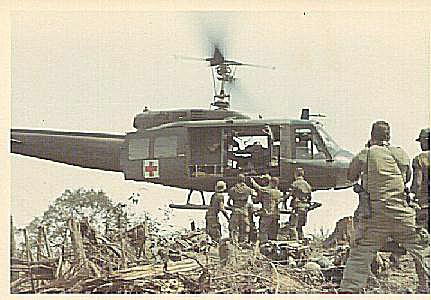 |
|
Medevac
chopper ferrying the dead and wounded in the Vietnam War |
I wondered, "Why any of
us?" I touched the blood soaked fabric of my jungle fatigues as the
medevac chopper ferried the dead and wounded away and wondered
whether the price of freedom was worth the cost of the man's life who
clutched my arm and sought that eternal answer: "Why me, why not you?"
We were on high alert through
the night, anticipating a dawn attack. Vietnam sunrises
are some of the most beautiful in the world. The sun
ignites the underbelly of low-hanging clouds, washing it in a palette
of colors that are rose blush, light pinks that streak across the gray
canvass, the rosettes seducing the mind into believing that peace and
tranquility ruled rather than chaos and death the earth below.
Slowly, the sun's tidal rays washed
away the night. I stared down at the ribbon of Highway
One, an empty dirt arrow slicing through the verdant jungle and
coastal green that served as the main route from North to South, from
freedom to tyranny.
It was empty.
As the sun inched along its elliptical arc I squinted at the road, my
rifle resting on the parapet we formed to defend ourselves the night
before. The blood on my jungle fatigues was dried and
caked, a rust-colored reminder of the man whose body grew cold in my
arms, wondering in his final moments why he had been chosen to pay the
final price rather than I.
I clenched my teeth.
Why? Why?
Then I stiffened, my
finger sliding to the trigger housing of my rifle. Out of
the green lush jungle appeared a black dot far away, moving slowly
toward the town of Mo Duc. Was it a villager or a Viet
Cong strapped with a pack of C-4 who would run wildly at our positions
below and blow himself up as he sought to take out as many of us as
possible.
Suicide bombers are not new.
Even young children were used to carry satchel charges in Vietnam and
hoped as they rushed toward us that someone wouldn't shoot, and the
child could leap into a foxhole and pull the cord to send us to our
Hell.
I watched the black dot grow in
size and form. The villagers wore the black pajamas of
their trade, and conical hats to avert the sun, with no shoes.
The figure was nonplussed, moving at a soft pace.
My eyes flicked up the road.
Out of the green more black dots appeared, small ant-like shapes
appearing magically from the dense green, embraced by the stark
nakedness of Highway One.
Eventually, the road was filled with the
figures, men and women, old and young, some with children, marching
toward the voting polls, defying the Beast of Terror who held Damocles'
Sword over their heads.
I was numb at first. The
road was pregnant with the figures, a thick black undulating sea of
people who were choosing an ultimate sacrifice--their mark for
freedom.
The day went by without event.
The NVA did not attack. The people voted that day for
democracy, and I sat atop the hill feeling a strange sense of purpose
welling within me.
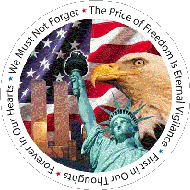 |
|
Witnessing the
people of Mo Duc voting, I understood the power of freedom |
For perhaps the first time in my life, I
understood democracy. I understood the power of freedom.
It was the willingness to risk everything for that precious right to
give yourself and your children the right to chose their own destiny,
and to remove the onerous yoke of others who tried to suppress that
fundamental right.
I reached down and touched the dried blood
on my leg, the blood of my buddy, who had wondered "why."
"You died for them," I said, as though he
was still in my arms, bleeding. "You died for their right to
vote."
When I seen the pictures of the Iraqi
prisoner mistreatment, or read the horror of war splashed like buckets
of worthless blood on television news reports or read slanted news
that seeks to demean our mission in Iraq, I think of Mo Duc.
I think also of June of this
year, when the people of Iraq will be handed the rights to freedom,
the right to vote for beliefs they alone hold true, without guns to
their heads.
Then I know that all those who
have died rise above the few who have tainted our mission by inhumane
actions toward Iraqi prisoners. I know the bodies of
those who died left this earth to answer the question: "Why me?"
and that answer is "For the freedom of others."
That leaves the question
of Iraq. Are those dying in Iraq dying for a "reason" that
will last their lifetimes, as my experience in defending Mo Duc has
served me for more than a generation?
Obviously, I can't answer
that for it is an individual decision one makes to feel the "worth of
war" or the "shame of it."
However, I can speak from
wisdom, from annals of time and burden of being reminded by the events
of current Iraqi "shame" unveiled by the horror pictures, that the
answer to "Why we die with honor" will always be vested in the pure
pursuit of liberty and freedom for the oppressed, whether or not we
are victorious in that goal or not.
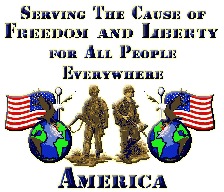 |
|
Hopefully, Mo
Duc serves as a reminder that liberty overrides shame |
As one individual who
has lived his life wondering "why" I have one thin thread of
justification that supports what many may call the "senseless death"
of Americans in Iraq, Vietnam or any other war we fight to free
others--and that thread grows stronger when I see or hear of a person
having the right to vote for his or her liberty, and that is about to
happen in Iraq despite the "shame" being shed on the thousands of
Americans risking their lives for that right.
May my Mo Duc be a reminder to
all critics that liberty overrides shame with time, at least for those
of us who carry its blood on our sleeves and soaked into the fabric of
our souls.
May
7--The
Thin
Moral
Box
Guarding
Iraqi
Prisoners
©2001
-
2004,
VigilanceVoice.com,
All
rights
reserved
-
a
((HYYPE))
design
|
|
|